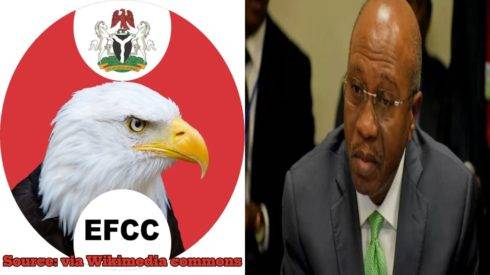The Economic and Financial Crimes Commission (EFCC) has formally charged former Central Bank of Nigeria (CBN) Governor Godwin Emefiele for his alleged misconduct during the controversial naira swap policy. Emefiele stands accused of authorizing the massive production of N684.5 million at a staggering cost of N18.96 billion, potentially causing significant harm to the public interest.
During his arraignment before Justice Maryann Anenih at the Federal Capital Territory (FCT) High Court in Abuja on Wednesday, Emefiele entered a plea of not guilty to the four charges leveled against him. The EFCC alleges that the former CBN governor deliberately disregarded legal instructions in carrying out the naira swap policy under the previous administration of President Muhammadu Buhari.
Emefiele Accused of Unauthorized Withdrawal from Federal Funds
The anti-corruption agency has leveled serious accusations against Emefiele, alleging that he improperly authorized the withdrawal of a staggering N124.8 billion from the Consolidated Revenue Fund of the Federation. These actions, according to the EFCC, were carried out with the aim of harming the public during the implementation of the naira swap policy.
As the case unfolds, Emefiele now faces three unresolved charges related to his alleged misconduct during his tenure as the CBN governor. The court proceedings promise to shed light on the intricate details and potential implications of the naira swap fiasco, which has drawn significant public scrutiny and criticism.
Naira Swap Policy Under Scrutiny in High-Stakes Trial
The naira swap policy, implemented under the Buhari administration, has been a source of controversy and debate, with accusations of mismanagement and potential financial irregularities. Emefiele’s actions during this period have come under intense scrutiny, with the EFCC alleging that he overstepped his authority and acted in a manner detrimental to the public interest.
As the trial progresses, the court will weigh the evidence presented by the EFCC against Emefiele’s defense. The outcome of this high-stakes case could have far-reaching implications for Nigeria’s financial sector and the accountability of public officials entrusted with safeguarding the nation’s economic interests.
Public Interest at Stake in Emefiele’s Trial
The charges against Emefiele strike at the heart of the public’s trust in the nation’s financial institutions and the individuals tasked with their oversight. The alleged unauthorized production of naira notes and the withdrawal of substantial funds from the Consolidated Revenue Fund raise serious concerns about the potential misuse of public resources and the erosion of fiscal accountability.
As the trial unfolds, the Nigerian public will be closely watching the proceedings, seeking answers and justice for any wrongdoing that may have occurred. The case serves as a reminder of the critical importance of transparency, integrity, and adherence to the rule of law in the management of the nation’s financial affairs.
Emefiele’s Plea of Innocence Sets Stage for Legal Battle
Despite the gravity of the charges against him, Emefiele has maintained his innocence, entering a plea of not guilty during his arraignment. This stance sets the stage for a legal battle between the former CBN governor and the EFCC, with both sides likely to present compelling arguments and evidence to sway the court’s ruling.
As the trial unfolds, legal experts and observers will scrutinize the proceedings, analyzing the strength of the prosecution’s case and the validity of Emefiele’s defense. The outcome of this high-profile case could have far-reaching implications for the accountability of public officials and the integrity of Nigeria’s financial system.
Transparency and Accountability in Focus as Trial Proceeds
The trial of Emefiele represents a pivotal moment in Nigeria’s ongoing efforts to combat corruption and ensure transparency and accountability in the public sector. As the nation grapples with the fallout from the naira swap policy and its potential consequences, the proceedings will be closely watched by citizens, policymakers, and international observers alike.
With allegations of unauthorized actions and the misuse of public funds at the forefront, the trial will serve as a litmus test for Nigeria’s commitment to upholding the rule of law and safeguarding the integrity of its financial institutions. The outcome could shape public perception and restore confidence in the nation’s economic governance, or it could fuel further skepticism and calls for sweeping reforms.
Table of Contents
Discover more from OGM News NG
Subscribe to get the latest posts sent to your email.














